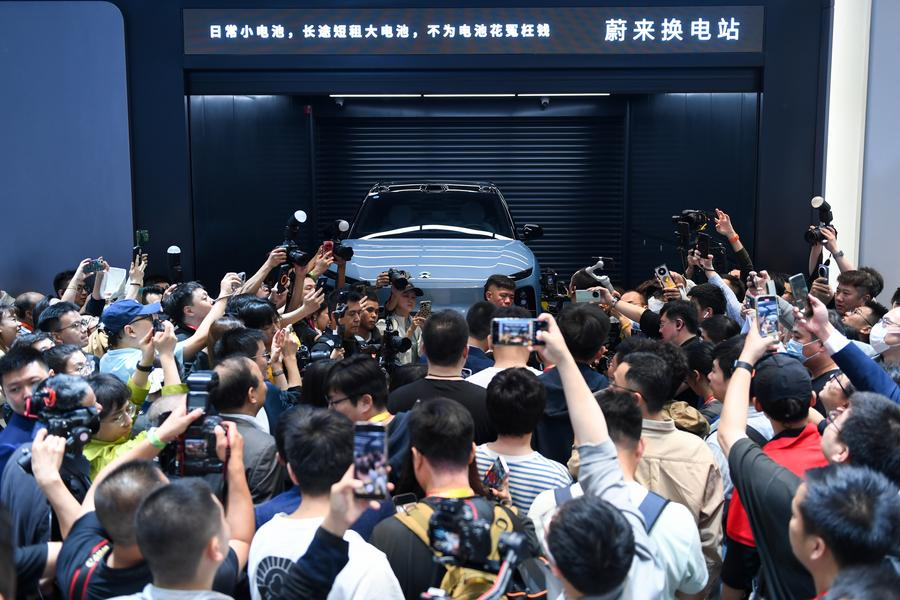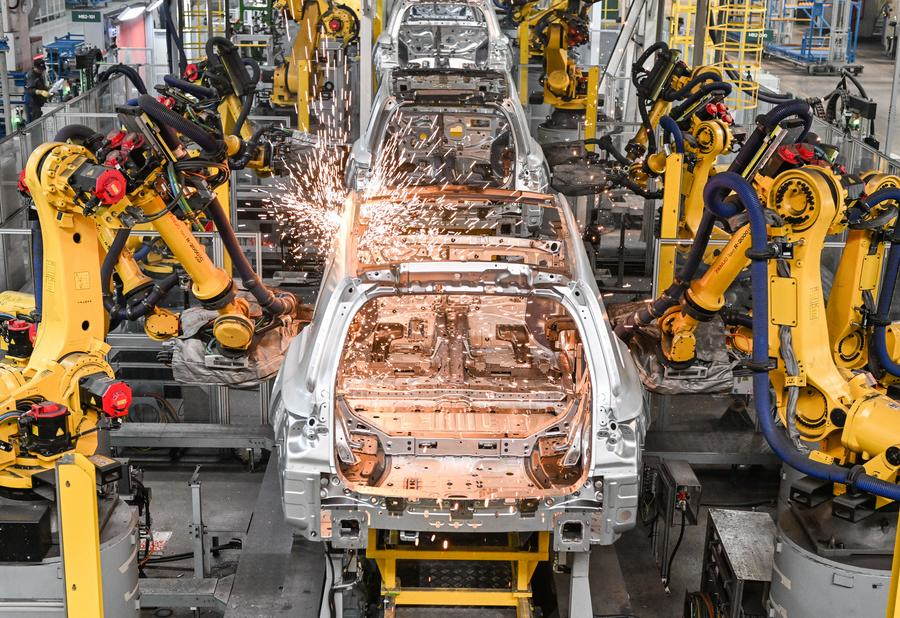Decoding secrets behind the rise of China's NEVs

Visitors watch the demonstration of a battery swap station of Chinese brand NIO at the 2024 Beijing International Automotive Exhibition in Shunyi District, Beijing, capital of China, April 25, 2024. [Xinhua/Ju Huanzong]
BEIJING -- Attending China's largest auto show, it is impossible to ignore the popularity of new energy vehicles (NEVs), which are changing the world's largest auto market at an intense pace.
Organizers revealed that 117 new models will be making their debuts at the ongoing 18th Beijing International Automotive Exhibition (Auto China 2024), which runs through May 4. Overall, 278 NEVs are set to go on display, with Chinese NEVs being the superstars of the show.
Their cutting-edge technologies, customer-friendly novelties and affordability have wowed visitors at the show and underlined how the Chinese NEV sector has succeeded in zooming ahead over the past decade.
CHINA SPEED
"What are we focused on? Speed. China speed," said David Slump, President and CEO of Marelli, a leading global automotive supplier betting on China's thriving new energy and smart vehicle sector.
During an interview with Xinhua at the auto show in Beijing, Slump highlighted the speed of technology, speed of delivery, speed of production and speed of the market's development, a blistering pace which he believed was important for the company and the sector.
The show opened soon after green vehicles reached a milestone in China, accounting for more than half of the country's passenger car sales in the first two weeks of April.
This milestone has been reached much earlier than the country's initial target of 2035.
China's NEV sales surged 37.9 percent year on year to about 9.5 million last year, compared with just 75,000 a decade ago, according to the China Association of Automobile Manufacturers.

Robots weld bodyshells of cars at a workshop of Chinese electric vehicle (EV) maker Li Auto Inc. in Changzhou, east China's Jiangsu Province, Jan. 10, 2024. [Xinhua/Ji Chunpeng]
COMPETITIVE MARKET
Competition in China's NEV industry has intensified, with both domestic and international brands rushing to announce price cuts and release new models in a bid to secure market share.
Last week, Chinese EV brand Li Auto announced that it would cut the prices of several of its models by up to 30,000 yuan (about 4,225 U.S. dollars), and vowed to refund the difference to owners who bought these models earlier this year.
Price cuts in the first quarter of 2024, mainly involving NEV models, are equivalent to 60 percent of the cuts seen in the entire 2023 and equal to the price reductions implemented in the whole of 2022, said Cui Dongshu, secretary general of the China Passenger Car Association.
Industry analysts indicated that this fierce competition is a result of the transition of China's NEV sector from a period of massive investment to a mature market -- a market that is likely to be reduced to a few leading firms.
"It's hard to see the competition easing in the short term," said Gu Huinan, general manager of GAC AION, which unveiled its new NEV model AION V at the ongoing show in Beijing.
Gu viewed the increasing NEV competition as a boost for the industry in that it catalyzes technological innovation and fosters an industrial ecosystem.
"It forces automakers to progress, and only those with a complete industrial chain, advanced manufacturing capacity to minimize costs, fast technological innovation, and a flexible mechanism to adapt to market changes, are expected to survive," said Gu.
Fierce market competition will accelerate changes in the sector and help transform China into a global auto-making powerhouse, Gu said.
OPEN INNOVATION
Continuous innovation and input in research and development have pushed China's NEVs from also-rans to champions. Such efforts are not only driving domestic growth, but also turbo-charging innovation across the global automotive landscape.
CATL, a leading Chinese battery manufacturer, launched a new battery at the auto show in Beijing, featuring a world-first innovation that offers a 1,000-km range and supports ultra-fast charging.
This breakthrough allows for a 600-km range to be achieved by just 10 minutes of charging, representing a recharge rate of "1 kilometer per second."
"Innovation is the key driver of our continuous development," a CATL spokesperson told Xinhua, adding that the company is investing heavily in research and development, which totaled 18.4 billion yuan last year.
While the world is turning climate consensus into action, many obstacles remain. Technological inequality persists, and some countries are slowing the pace of the green energy transition, which creates challenges in advancing a sustainable future for the world. "Today, we need to unite as never before to tackle these pressing challenges, and I believe an open approach to innovation is the solution," the spokesperson said.
CATL is sharing its battery technology with its partners through an innovative model of licensing, royalties and service. "By sharing battery technology and servicing the construction and operation of battery plants, we support our partners as they build their own plants and ultimately manufacture their own batteries."
WIN-WIN COOPERATION
At the current auto show in Beijing, the exhibition stands of Volkswagen and Chinese EV maker XPENG are located side by side, signaling the close cooperation between the two companies.
In February, Volkswagen agreed to carry out strategic technical collaboration with XPENG to develop two intelligent connected vehicle models for the Chinese market.
This came after the German automaker announced a substantial 700-million-dollar investment in XPENG last year, acquiring a nearly 5-percent stake in the company to collaboratively develop and manufacture electric vehicles.
NEV industry players are seeking closer cooperation to tap into the expanding market. As China's NEV market further thrives, the tailwinds are blowing beyond China, providing more opportunities for the global sector.
"We're not just producing quality vehicles, but working with our partners around the world to build a new ecosystem that is open and innovative, and expanding the group of friends for win-win cooperation," said Yin Tongyue, chairman of Chinese automaker Chery Automobile Co., Ltd.
























